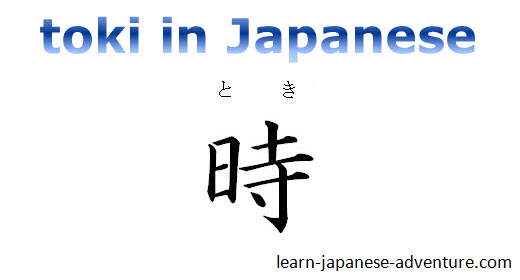- Home
- Intermediate Lessons
- toki in Japanese
Using toki in Japanese -
Intermediate Lessons: 13
In this lesson, you will learn to use toki in Japanese (時 - とき) to express the time when some states or actions exist or occur.

とき (toki) connects two sentences and expresses the time when the state or action described in the main sentence takes place.
Sentence Patterns
Let's take a look at the sentence patterns first...
| Verb dict-form | とき | Main sentence |
| Verb ない-form | とき | Main sentence |
| Verb た-form | とき | Main sentence |
| い-adjective | とき | Main sentence |
| な-adjective + な | とき | Main sentence |
| Noun + の | とき | Main sentence |
As shown above, the different forms of Verbs, い-adjectives, な-adjectives and Nouns that are connected to とき are the same as the forms when nouns are modified.
Let's use some examples to show how to form sentences using toki in Japanese...
|
1. |
図書館で本を借りる とき、カードが要ります。 |
|
2. |
使い方が分からない とき、田中さんに聞いてください。 |
|
3. |
体の調子が悪い とき、医者へ行きます。 |
|
4. |
暇な とき、テレビを見ます。 |
|
5. |
母が病気の とき、会社を休みます。 |
|
6. |
学生の とき、あまり勉強しませんでした。 |
|
7. |
子供の とき、よく海で泳ぎました。 |
Tense Does Not Matter in Adjective & Noun Sentences
The tense of adjective sentences and noun sentences which modify とき is not affected by the tense of the main sentence.
In example 6 above, the English translation is "When I was a student, I did not study much". You used past tense for both the first sentence and second (main) sentence.
However in Japanese, you don't need past tense for the noun sentence in front of とき (学生のとき - gakusei no toki). Tense does not matter here.
In example 4 above, the English translation is "I watch TV when I am free". You can also say 暇なとき、テレビを見ました (hima na toki, terebi wo mimashita), which translated to "I used to watch TV when I was free".
In both cases, it's still 暇なとき (hima na toki). The tense of the な-adjective sentences in front of とき is not affected by the tense of the main sentences.
Let's use another two examples for toki in Japanese with adjective and noun sentences.
|
1. |
母は若い とき、きれいでした。 |
|
2. |
鈴木さんは二十五歳の とき、結婚しました。 |
As you can see, both examples are talking about past events but the tense of the adjective and noun sentences are not affected by the main sentences (in Japanese).
toki in Japanese has Different Meanings for Verbs in Present or Past Tense
With verbs, it helps to keep in mind that non-past form indicates an action that happens "all the time" or is "not yet completed". The past form is used when the action is "over and finished".
Let's check out some examples...
|
1. |
日本へ行く とき、カメラを買いました。 |
|
2. |
日本へ行った とき、カメラを買いました。 |
In example 1 above, 行く (iku) indicates that the action had not been completed. The speaker bought a camera somewhere on his/her way to Japan. (the camera could be bought in his/her own country).
In example 2 above, 行った (itta) indicates that the action had been completed and the speaker bought a camera after arriving in Japan.
More Examples for toki in Japanese with Verbs
- 寝る とき、「おやすみなさい」と言います。
neru toki, "oyasuminasai" to iimasu
Meaning: I say "Good Night" before going to bed.
In this case you cannot use 寝たとき (neta toki) because it will mean that you are saying "Good Night" while you are sleeping.
- 部屋に入る とき、「失礼します」と言います。
heya ni hairu toki, "shitsurei shimasu" to iimasu
Meaning: I say "Excuse Me" before entering the room.
In this case you cannot use 部屋に入ったとき (heya ni haitta toki) because it will mean that you are saying "Excuse Me" after you have entered the room. It's considered rude if you do this to your boss.
- 今朝友達に会った とき、「おはようございます」と言いました。
kesa tomodachi ni atta toki, "ohayou gozaimasu" to iimashita
Meaning: I said "Good Morning" when I met my friend this morning.
In this case you cannot use 今朝友達に会うとき (kesa tomodachi ni au toki) because it will mean that you were saying "Good Morning" before you met your friend. You would be talking to no one if you did that.
Common Mistake While Using toki in Japanese
There is one common mistake that many people make when they using toki in Japanese. とき (toki) is a time expression.
Therefore if there is already a time expression in a sentence, you don't add in とき after that time expression.
For example, 朝 (asa - morning) is already a time expression, so you cannot combine it with とき and say 朝のとき (asa no toki).
If you use a term that is not a time expression like 眠い (nemui - sleepy), then you can combine it with とき and say 眠いとき (nemui toki). For example...
|
1. |
朝の とき、コーヒーを飲みます。 X |
|
2. |
眠い とき、コーヒーを飲みます。 O |
Using Verb て-form いる with toki in Japanese
You can also use Verb て-form いるとき to express the time in the middle of action, while you are doing something.
For example, ご飯を食べているとき (gohan wo tabete iru toki) means in the midst of eating.
- ご飯を食べる とき
gohan wo taberu toki
Meaning: before eating meal
- ご飯を食べている とき
gohan wo tabete iru toki
Meaning: in the midst of eating meal
- ご飯を食べた とき
gohan wo tabeta toki
Meaning: finished eating meal
Let's use some examples to show this...
- ご飯を食べている とき、山田さんがうちへ来ました。
gohan wo tabete iru toki, yamada san ga uchi e kimashita
Meaning: While I was eating, Mr Yamada came to my house.
- ゆうべ寝ている とき、地震がありました。
yuube nete iru toki, jishin ga arimashita
Meaning: While I was sleeping last night, there was an earthquake.
Mystery Sales! Get 45% Forever OFF Premium & Premium PLUS! Ends on 20 Feb 2026
The link above is an affiliate link, which means that I would earn a commission (at no extra cost to you) if you do end up purchasing the related learning course.
Previous - Lesson 12: Japanese Verb te-form
Buy me a coffee







